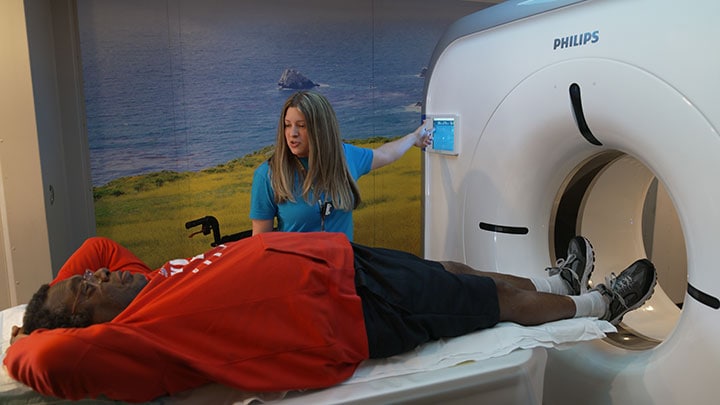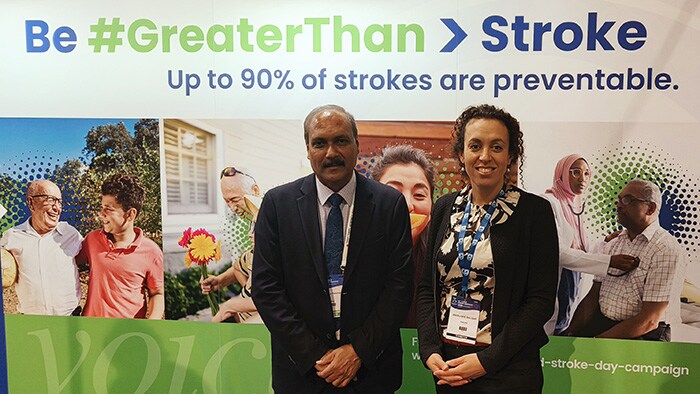Lung cancer is one of the world’s silent killers. By the time patients experience symptoms, the tumors in their lungs have often grown to the point where they are inoperable or have metastasized to other parts of the patient’s body. Lung cancer remains the biggest contributor to mortality among all cancer types globally [1], with tobacco smokers at particularly high risk. In the U.S. alone, lung cancer is estimated to cause around 130,000 deaths per year [2].
However, if lung cancer is detected early, before symptoms appear, treatments are available that can significantly reduce the risk of death. The cost of early detection and treatment is typically also lower than the cost of late-stage interventions. While public education programs and policy initiatives to help people stop smoking and cultural changes that make smoking less attractive are driving down smoking rates, they won’t help those already at high risk due to their smoking history or past exposure to airborne carcinogens such as asbestos fibers or coal dust. For these reasons, there is a growing need for more effective screening programs to detect and treat early-stage lung cancer.
Current screening programs, which typically rely on low-dose chest CT scans, target high-risk groups based on metrics such as age and ‘pack year’ score (the number of packs of cigarettes a patient has smoked per day multiplied by the number of years they have smoked) and have been proven to reduce mortality by as much as 20% [3]. Yet despite these programs, the number of high-risk individuals being screened remains stubbornly low. In the U.S. it is less than 6% [4]. In part, this low participation rate is due to screening programs not being easily accessible, especially in remote and rural communities.
Bringing lung cancer screening to the Buffalo community in New York state
In 2022, Philips teamed up with Roswell Park Comprehensive Cancer Center (Buffalo, New York, U.S.) to create truck-based mobile CT lung cancer screening units that can be taken into the Buffalo community. Equipped with Philips’ latest Incisive CT scanners, these mobile units are already helping Roswell Park’s Project Eddy (Early Detection Driven to You) to get more people screened.
“For more than a decade, the incidence of lung cancer has been higher in the city of Buffalo than in the rest of the state of New York,” said Dr. Mary Reid, Chief of Cancer Screening, Survivorship and Mentorship at Roswell Park Comprehensive Cancer Center (Buffalo, New York, USA). “More than 36% of New York state residents have to drive at least an hour to access a CT scan. We needed to move screening outside of institutions and hospitals and offer it in the neighborhood where people will get used to seeing it.”
Buffalo’s firefighter association was one of the first to sign up for the Project Eddy screening program. Due to increased exposure to carcinogens such as asbestos fibers and radon gas, its firefighters are 60% more likely to develop lung cancer than the general population.
“Since partnering with Project Eddy, we actually brought screening to our firehouses in Buffalo and caught cancers, and people are now healthy and able to return to work,” said Chris Whelan, Trustee for Buffalo Professional Firefighters Local 282. “Our participation rate is close to 90% and it allows our members to see that this community cares about them to make sure we’re doing what we can do to keep them safe while they’re doing a dangerous job.”
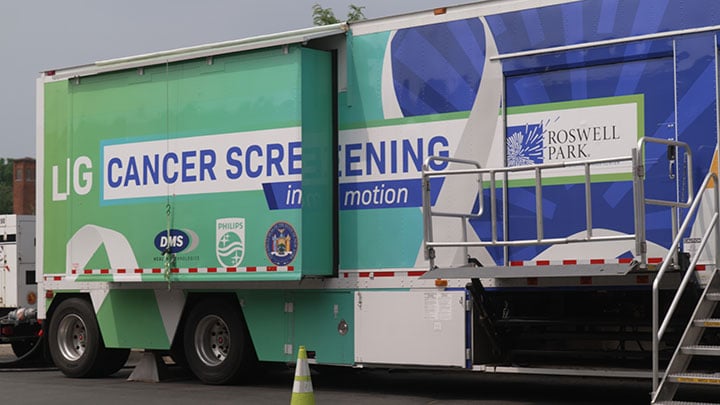
Equipped with a Philips Incisive CT scanner, Roswell Park’s mobile CT units are delivering lung cancer screening to people in remote and rural areas and high-risk groups such as firefighters in Buffalo, USA.
Serving miners in the Australian outback
Miners and their immediate families are another group with an elevated risk of developing lung cancer and respiratory diseases such as pneumoconiosis (black lung disease), silicosis, asbestosis, emphysema, chronic bronchitis and mesothelioma. The incidence of lung cancer in regional, rural and remote areas of Australia is around 30% higher than in the rest of the country.
Screening miners and their families in the rough terrain of the Australian outback, in off-road locations that often lack a stable electricity supply, posed a significant challenge for front-line specialist medical service provider Heart of Australia. To solve the challenge, the Philips engineering team supported Heart of Australia to design the world’s first solar and battery powered low-dose CT scanner housed in a ruggedized 26-meter B-double truck. While the unit can operate stand-alone in terms of its power requirement, it is not stand-alone in terms of clinical expertise. An advanced tele-PACS communication system means that remote clinicians can view CT scans within minutes, make a diagnosis, and decide on the best treatment for the patient. Philips Incisive CT scanner and artificial intelligence (AI) driven Precise Image software ensure diagnostic-quality imaging at the low radiation dose required for screening programs.
“People exposed to dust and respiratory hazards in mines, has been a significant issue with many miners developing mine dust lung diseases. Miners now get much more than just a CT chest scan. They get a comprehensive health assessment including lung function, occupational health checks, and hearing tests. We coordinate with the whole care team to discuss what could be wrong with each patient and how best to treat them next. It’s much more than just taking a scan and moving on to the next mining town,” said Professor Catherine Jones, lead radiologist at Heart of Australia.
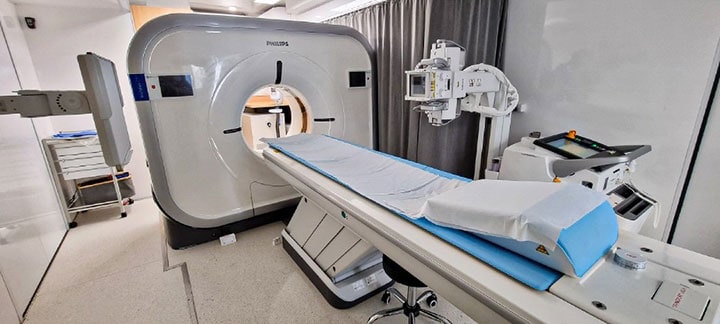
The Philips Incisive CT scanner powered by solar and battery energy installed in Heart of Australia’s mobile CT unit delivers the diagnostic image quality and low radiation dose needed for lung cancer screening.
In its first year of operation, Heart of Australia’s mobile CT unit delivered over 2500 patient consultations, took more than 2,500 X-rays, performed more than 500 CT scans, and diagnosed 159 cases of respiratory disease. But as its name implies, lung cancer and respiratory disease are not the only targets for the Heart of Australia program. With five mobile units currently deployed across underserved rural and remote communities, it is also delivering cardiology services including stress tests, ECG’s and echocardiograms with Philips ultrasound equipment as well as delivering 10 other medical specialties.
Facilitating access to high quality care on hospital ships
The diagnostic capabilities of Philips CT scanners are also being put to use on the world's largest civilian hospital ship – the Global Mercy operated by the international Mercy Ships charity – helping to deliver high quality free-of-charge healthcare to people in some of the poorest countries in the world. That includes two young boys from Senegal who were grappling with developmental issues that caused their legs to bow outwards. With the arrival of the Global Mercy in a nearby port, their likely despair turned to hope after their condition was diagnosed and their path to recovery determined with the help of Philips’ CT technology and the expertise of the ship’s medical staff. During its latest 10-month voyage, a significant number of the 2,500 to 3,000 operations performed onboard the Global Mercy have relied heavily on the capabilities of the onboard Philips Incisive CT scanner.
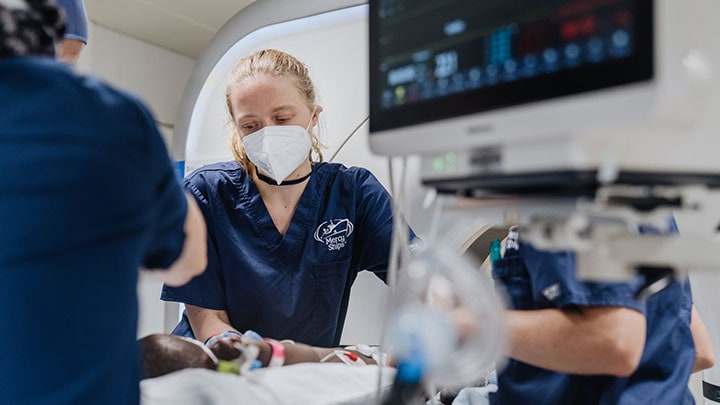
The Philips Incisive CT scanner aboard the Global Mercy helps surgeons accurately assess and plan safe surgery for patients.
“The role of Philips’ CT scanner on board has been pivotal in facilitating accurate diagnoses and ensuring optimal outcomes,” said Martha Henderson, the Global Mercy’s onboard radiology technologist. “With its short scanning times, it reduces breath-hold time, decreasing patient anxiety. We can obtain diagnostic quality imaging by prioritizing patient safety and minimizing radiation dose without compromising scan quality. The CT scanner also provides emergency imaging for the 500+ crew on board the vessel.” [1] Sung, H, Ferlay, J, Siegel, RL, Laversanne, M, Soerjomataram, I, Jemal, A, Bray, F. Global cancer statistics 2020: GLOBOCAN estimates of incidence and mortality worldwide for 36 cancers in 185 countries. CA Cancer J Clin. 2021: 71: 209- 249. https://doi.org/10.3322/caac.21660
Visit Philips at RSNA 2023 (Booth #6730) where the latest Philips CT 5100 - Incisive scanner will be featured.
For more information on Philips and Roswell Park’s mobile lung cancer screening program, visit Project Eddy.
For more information on Philips’ partnership with the Heart of Australia Program and Philips Foundation’s efforts with the Mercy Ships charity, visit Philips and Heart of Australia and Philips Foundation and Mercy Ships.
[2] American Cancer Society, Key Statistics for Lung Cancer. https://www.cancer.org/cancer/lung-cancer/about/key-statistics.html
[3] The National Lung Screening Trial Research Team. Reduced lung-cancer mortality with low-dose computed tomographic screening. N Engl J Med 2011;365:395-409. https://www.nejm.org/doi/full/10.1056/nejmoa1102873
[4] American Lung Association, State of Lung Cancer, Lung Cancer Key Findings, Screening and Prevention. https://www.lung.org/research/state-of-lung-cancer/key-findings
[5] Life of the product is defined by Philips as 10 years. Tube for Life guarantee availability varies by country. Please contact your local Philips sales representative for details.
Share on social media
Topics
Contact

Kathy O'Reilly
Philips Global Press Office Tel.: +1 978-221-8919
You are about to visit a Philips global content page
Continue